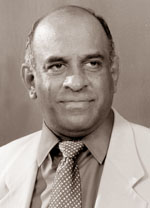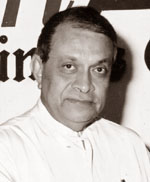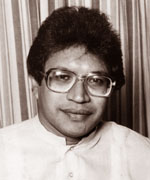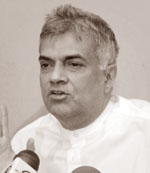
Shades of authoritarianism to the fore in UNP
POLITICS: The recent kerfuffles in the SLFP have been so interesting,
for observers of politics, that relatively less attention has been paid
to developments within the UNP. This is not however surprising, given
that the general picture presented is that turmoil within the UNP has
ceased with the departure of those who had tried to rock the boat.
The traditional supporters of the UNP then are delighted, while it
seems that those who support the government are not at all concerned
about this. After all the SLFP itself has never really been interested
in the internal workings of the UNP.
Indeed it only began to pick off people from within the UNP as
recently as 2000, when there was a fairly substantial exodus, of whom
the most prominent today is Sarath Amunugama.
Its earlier venture into the field, in 1991 when the UNP split
spectacularly, was in fact initiated by UNP dissidents. These maintained
their own independent identity through the DUNF, even though they broke
conclusively with the UNP and acknowledged Mrs Bandaranaike as the
potential head of any alternative government.
Crossovers and intra-party tensions in the past
|

Rukman Senanayake
|
The approach of the UNP had been very different from the start,
perhaps understandably given that the SLFP had been set up by S. W. R.
D. Bandaranaike when he and a few others broke away from the UNP in
1951. Winning them back one by one then, at least those who had
initially been in the UNP, may have seemed always on the cards.
So within a few years the UNP had managed to attract back
Bandaranaike’s principal lieutenant, Bernard Aluwihare, which is why
there was such trauma in the SLFP about the succession when SWRD was
assassinated.
CP de Silva, the deputy at the time, passed over once in favour of
Dahanayake, who was doubtless for caste reasons hastily and disastrously
made Prime Minister, led the party at the March 1960 election but he was
then persuaded to yield to Mrs Bandaranaike after the SLFP failed to win
that election.
So, though C. P. de Silva served faithfully as her deputy for four
years, after she triumphed in the July 1960 election, it was easy for
the UNP to entice him to cross over in 1964 when the accession of
Marxists made him feel that the original Bandaranaike moderation had
been superseded.
He was not the only one, which was how her government fell
prematurely, as Chandrika’s government fell in 2001. In both instances
financial inducements played a large part, though in both instances too
there were those like de Silva himself who genuinely felt the SLFP was
being led astray.
In the late seventies, despite the sad community of interests between
the Bandaranaike led opposition and the UNP’s Cyril Mathew wing over
opposition to Dudley Senanayake’s District Councils Bill, the SLFP made
no attempt to take Mathew into its ranks even after dudley Senanayake
removed him from the Secretaryship of the UNP.
In the seventies however the UNP continued to take over SLFP
dissidents, the most prominent being Ronnie de Mel.
|

Karu Jayasuriya
|
With the new constitution J R Jayewardene stopped crossovers in
principle, though he instituted provisions to allow those in the
opposition to cross over to his side, a provision Ranil Wickremesinghe
tried to reintroduce in 2002. But by the eighties indeed the strategic
brilliance of the UNP leader had led to a new game, which was to ensure
turmoil within the opposition.
The account of how JR promoted dissension in the SLFP, most obviously
by sending Mrs Bandaranaike a recording of Maithripala Senanayake’s wife
talking of the need for her husband to take over the leadership of the
party after Mrs Bandaranaike’s Civic Rights had been removed, made
fascinating reading in the 1983 equivalent of today’s newspaper gossip
columns.
Anura Bandaranaike, then as now, played a prominent role in the
dispute, and was part of Senanayake’s rival group, while Vijaya and his
wife Chandrika Kumaratunga came to the fore in Mrs Bandaranaike’s
faction and were thus able to ensure that the left-leaning Hector
Kobbekaduwa became the party’s candidate for the 1982 Presidential
Election.
With that faction being formally recognised, Anura Bandaranaike came
back into the fold, albeit too late to offer himself as the presidential
candidate, though that may have been what he had hoped for and what his
mother would have liked.
Unfortunately Mrs Bandaranaike was not so ready to forgive Senanayake,
who found himself out in the cold and therefore ended up actually
supporting the government in the 1982 referendum to extend the term of
parliament until 1989.
JR meanwhile could claim that the SLFP had been taken over by
Naxalites, as he characterised Vijaya Kumaratunga, and clap him in jail.
Anura Bandaranaike obligingly went abroad, so that campaigning during
the referendum became as one-sided as the actual conduct of the
referendum with its massive stuffing of ballot boxes.
An opposition of course cannot so readily play this game, of creating
turmoil within its opponents, so when Chandrika Kumaratunga was in power
in 2001, Ranil Wickremesinghe happily accepted S B Dissanayake and the
rest when they crossed over.
|

Gamini Athukorale
|
As a sop to their image, he even adopted the concept of a United
National Front, rather than the UNP, which allowed them some semblance
of independence in the election that followed, which propelled him to
power.
The SLFP meanwhile, having taken Amunugama in 2000 in pursuit of
constitutional reforms, forgot about potential recruits from the UNP and
moved into alliance with the JVP, informal in 2001 and formal in 2004,
which facilitated its resuming full control of the government after the
2004 election.
Interestingly, without prejudice to his election manifesto, Mahinda
Rajapaksa took in a few crossovers from the UNP almost as soon as he
became President. Both Rambukwelle and Samarasinghe seem to have
acquitted themselves well in office, and made it even clearer that
President Rajapaksa was not the communist racist controlled by the JVP
and the JHU, which he was painted as by the traditional supporters of
the UNP and their foreign friends.
But such a characterisation, based not on rationality, but on what
Shakespeare described as a woman’s reason (I think him so because I
think him so), cannot be challenged by evidence or argument.
It will continue to the end of time, even though the JVP has now
abandoned the government, though the JHU has moderated its calls for the
abrogation of the ceasefire, and though those who negotiated with the
Tigers on behalf of Ranil Wickremesinghe are now part of the Rajapaksa
team.
These last, Prof Pieris and Moragoda, certainly add intellectual and
international weight to the government, whatever their individual
shortcomings.
However, forgetting the high praise bestowed on them in the past,
they are now characterised by those who deplore the crossovers as
variously useless theoreticians, the worst of the worst, desperate for
portfolios because they are too old to obtain them when the UNP returns
to power and troublemakers of whom the party is well rid.
This last description is particularly interesting in the light of the
revelation that the witch hunt still continues. Recent reports indicate
that both Sajith Premadasa and S B Dissanayake, clearly the only
characters still left in the UNP who still have a substantial
independent national following, have been heavily criticised at recent
meetings of the existing UNP hierarchy.
Indeed the account of what was described approvingly as the cutting
down to size of Premadasa asserted directly that he was an agent of the
President who was supposed to continue to stir up trouble within the UNP.
Dissanayake meanwhile was accused of originating the revolt in the
party, and had to swear fealty, rather like the poet Ysinno in Lakdasa
Wikramasinha’s devastating critique of feudalism, before he was once
more considered kosher.
|

Ranil Wickremesinghe
|
But, all told, reports of the problems within the UNP have made
instructive reading for those who can remember previous reports, which
however our political columnists in general assume no one can do. A
wonderful example of this is provided by the accounts of Karu
Jayasuriya’s removal from the Deputy Leadership of the Party, which
after he crossed over was characterised as entirely his own fault.
One account that would ordinarily have been thought relatively
objective claimed that he had taken himself out of the running by not
being present at the party convention. A few weeks earlier however the
claim in several reports was that Karu Jayasuriya could not be appointed
Deputy Leader because there was no such position in the UNP
constitution.
Some reports then claimed that Wickremesinghe had specially created
the position for Jayasuriya, who was a political neophyte graciously
promoted by Wickremesinghe and, though such irregularities were
acceptable in the past, they were now no longer proper.
The UNP Constitution
Characteristically, no political columnist seemed to have looked at
the UNP constitution, nor was its evolution discussed in terms of the
actual history of the party, and its National Leader.
Now having managed to obtain a copy of the document, initiated by
Gamini Athukorale (though I gather it has been amended since, to
accommodate Rukman Senanayake and Tissa Attanayake, the new cutting edge
of the party), I can understand why no newspaper committed to the UNP
thinks of giving any prominence to it whatsoever.
The document is quite preposterous, based on the sort of
authoritarian concepts that would be suitable in countries that still
revere Great Leaders, such as North Korea. Earlier I had assumed that
that sort of approach was characteristic only of Prabhakaran in Sri
Lanka, and I said as much when I described the document called
‘Structure of Tamil Eelam Judicial Administration’, which begins with
the claim that ‘It functions on the basis of the direct approval of
Prabhakaran, the National Leader.’ and adds ‘All laws are made with his
approval.’
Now however, having seen the UNP Constitution I can understand the
cosy relationship that was built up between Prabhakaran and
Wickremesinghe. Unlike in the days of D S Senanayake and his successors
as UNP leader, Wickremesinghe is now the leader for life of the UNP, in
terms of a change he introduced in 1995.
There is only a single reference in the entire Constitution to the
manner in which the ‘National Leader’ of the UNP emerges, and that is in
Section 8.1 which provides that, when there is a vacancy, the National
Executive Committee selects the National Leader. Alternately, that power
can be delegated to the working committee by a proposal ratified by the
Executive Committee.
So, clearly, the National Leader in office at the time the
Constitution became operative is therefore as long as he wants.
And that National Leader controls all other positions, in that he
either appoints directly or must nominate for ratification - or else
selection is either by the Working Committee that he nominates
absolutely as he wishes, or else by bodies such as nomination boards
that are appointed by that working committee.
A more centralised authoritarianism could not have been envisaged
even by the Dear Leader Kim Il Sung.
So, as far as the position of Deputy Leader goes, the National Leader
must make a nomination each year, which the Annual Party Congress must
ratify. Wickremesinghe however,failed to make a nomination this year,
obviously because he was angry with Jayasuriya but did not have the
gumption to promote anyone else.
And he could be sure that no political commentator would draw
attention to his breach of his own constitution. Instead, after the
initial claim that there was no such position, which is palpably false,
the myth has now crystallised that it is all Jayasuriya’s fault for not
attending the Convention, and that the Dear Leader was waiting to
nominate him had he turned up.
And there is more of this sort. After the barrage of propaganda, many
people in Colombo, if nowhere else, will claim that the Dear Leader’s
initial appointment of Jayasuriya as Deputy Leader was an act of
kindness to a political neophyte. However, the fact is that the
appointment was made after he had triumphed at the General Election of
2000, with a massive vote even though he had been moved to Gampaha.
Before 2000 he had in fact been Chairman of the Party, appointed to
that position in 1995 as successor to A C S Hameed, another party
stalwart who had become disgusted with Wickremesinghe by that stage.
During those five years there was no Deputy Leader, nor an Assistant
Leader, only a Chairman (Karu Jayasuriya) and a General Secretary (Gamini
Athukorale).
It was probably because he felt threatened by two such able
politicians that, in 2000, Wickremesinghe created the posts of Deputy
and Assistant Leader for them, and gave the two established positions to
acolytes without independent political standing, Charitha Ratwatte the
Chairmanship and I believe the now long forgotten Senerath Kapukotuwa
the Secretaryship.
It was then doubtless, on the argument that these two functionaries
should be free of representative obligations, that the Constitution
specified that they should not be members of Parliament. The real reason
clearly was to remove Jayasuriya and Athukorale from the positions.
That having been achieved, the Dear Leader has once more gone into
reverse gear, and appointed two members of Parliament, the obliging
Rukman Senanayake and the even more obliging Attanayake, to these posts.
Meanwhile, entertainingly, the Constitution specifies that the
Chairman and the Deputy Leader and the Assistant Leader would have their
functions decided on by the National Leader, and that they should always
act after consultation with the National Leader.
Despite such safeguards I suspect increasing paranoia will prevent
these last two positions being filled, at least not until the current
posse of acolytes have proved themselves even more obliging and/or more
royal than Ratwatte or Kapukotuwa or Malik Samarawickrema. |

